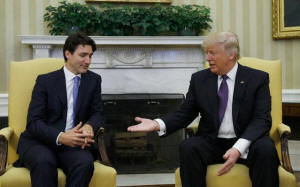|
Trump expects only 'tweaking' of trade
relationship with Canada
 Send a link to a friend
Send a link to a friend
 [February 14, 2017]
By Andrea Hopkins [February 14, 2017]
By Andrea Hopkins
WASHINGTON (Reuters) - President Donald
Trump said on Monday the United States would be "tweaking" its trade
relationship with Canada, stopping short of calling for a major
realignment in a development likely to please visiting Canadian Prime
Minister Justin Trudeau.
Trump has pledged to renegotiate the North American Free Trade
Agreement(NAFTA) linking the economies of the United States, Mexico and
Canada to make the terms more favorable to Americans.
At a joint news conference with Trudeau after White House talks, Trump
said his biggest concern with NAFTA was the U.S. trade relationship with
Mexico, which he has frequently accused of stealing American jobs.
"We have a very outstanding trade relationship with Canada. We'll be
tweaking it," Trump said.
"It's a much less severe situation than what's taking place on the
southern border. On the southern border, for many, many years the
transaction was not fair to the United States," he said.
Trump said the United States and Canada were stronger when they joined
forces in matters of international commerce, and both countries
benefited from having more jobs and trade in North America.
"We should coordinate closely - and we will coordinate closely - to
protect jobs in our hemisphere and keep wealth on our continent, and to
keep everyone safe," Trump said.

Trudeau carefully steered around questions about the Canadian trade
relationship with the United States in what was his first meeting with
the new president. He said he expected each country to always remain
each other's most essential partner.
"There have been times where we have differed in our approaches and
thatís always been done firmly and respectfully. The last thing
Canadians expect is for me to come down and lecture another country on
how they choose to govern themselves," Trudeau said.
Trump's vow to renegotiate NAFTA has unnerved Canadian officials, even
though he has singled out Mexico in his criticism of the free trade
deal. Canada sends 75 percent of its exports to the United States.
Canadians have become more supportive of NAFTA since Trump's election
victory on Nov. 8, a poll from the Angus Reid Institute showed on
Monday. Forty-four percent of the 1,508 surveyed said NAFTA had
benefited Canada, up from 25 percent from a poll last June.
Trudeau, when asked about Canadian firms' concerns about possible
changes to NAFTA, said: "It is a real concern for many Canadians because
we know our economy is very dependent on our relationship with the
United States.
"Goods and services do cross the border each day...we have to allow this
free flow of goods and services and we have to be aware of the
integration of our economies."
Trudeau had a strong rapport with former Democratic President Barack
Obama, prompting pundits to describe their relationship as a "bromance."
[to top of second column] |

Canadian Prime Minister Justin Trudeau (L) meets with U.S. President
Donald Trump in the Oval Office at the White House in Washington,
U.S., February 13, 2017. REUTERS/Kevin Lamarque

Soon after Trump put a hold on allowing refugees into the United
States and temporarily banned travelers from seven Muslim-majority
countries in an executive order on Jan. 27, citing the need to head
off attacks by Islamist militants, the Canadian prime minister took
to Twitter to say refugees were welcome in Canada.
'HUGE WIN'
Analysts said Trudeau, who has strong incentives to build a
relationship with Trump given rising anti-trade sentiment, is bound
to be happy with the first meeting.
"I thought it was a huge, huge win. The worst case scenario is we
wound up with an Australia moment, when a relationship that should
be on solid ground takes a bad turn," said Carlo Dade, director of
the Center for Trade and Investment Policy at the Canada West
Foundation.
"Instead, we actually got an endorsement of North American jobs, of
Canada-U.S. jobs, working together, no "America First" - just the
opposite," he added.
Details about a tense telephone call late last month between Trump
and Australian Prime Minister Malcolm Turnbull had created wariness.
The Washington Post, citing unidentified senior U.S. officials, said
Trump abruptly ended a phone call with Turnbull, even though
Australia has long been a staunch U.S. ally.
David Wilkins, former U.S. ambassador to Canada, said the priority
of the meeting was to set a positive tone, and that was
accomplished.
"The president's comment on the economy and creating jobs together
was a very positive sign for Canadians, especially those that had
been concerned about the trading relationship," said Wilkins. "I
think it was a win-win for both countries."

(Additional reporting by Steve Holland in Washington and David
Ljunggren in Ottawa; Editing by Grant McCool and Andrew Hay)
[© 2017 Thomson Reuters. All rights
reserved.]
Copyright 2017 Reuters. All rights reserved. This material may not be published,
broadcast, rewritten or redistributed. |